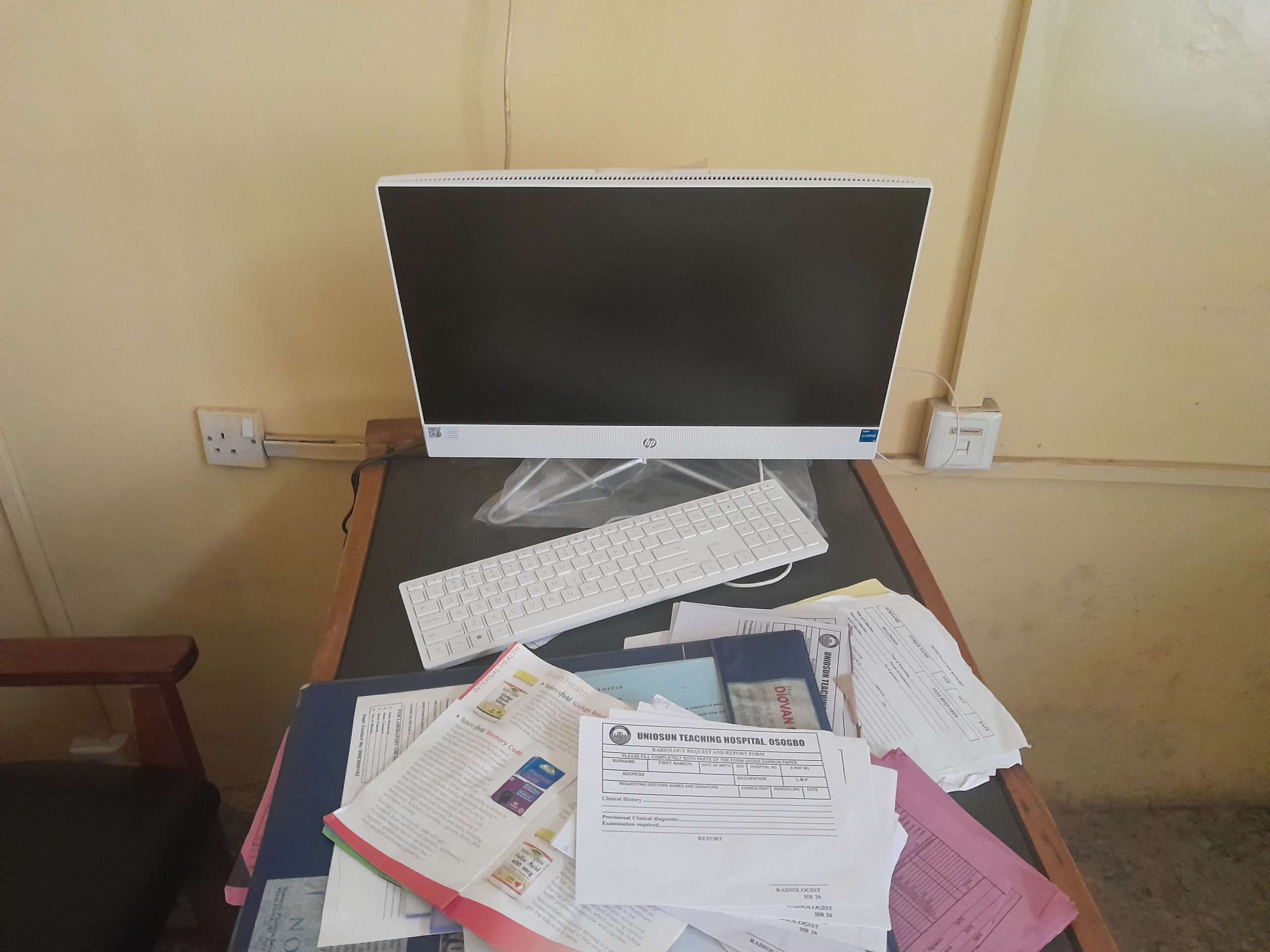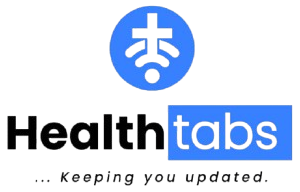Stacks of worn case notes with frayed edges from years of handling remains a common sight in the clinics and wards of UNIOSUN Teaching Hospital (UTH), Osogbo. At the same time, sleek desktop computers sit idle, competing for space with other items on consultation desks, their Electronic Health Record (EHR) software gathering virtual dust. More than a decade after Nigeria’s first foray into electronic medical records, many public hospitals still cling to paper, partly due to system inefficiencies.

With global transition from paper documentation of health records and growing calls for the adoption of EHR by the Nigerian health sector. According to a 2023 report of the Organisation for Economic Co-operation and Development, 15 of 27 surveyed countries had adopted a unified EHR system at national level as of 2021. HealthTabs investigates the adoption of EHR in Nigerian public hospitals.
Lagoon Hospital, a private tertiary healthcare facility in Lagos, was reported as the first hospital to adopt EHR in Nigeria in 2013. The Institute of Human Virology Nigeria, an affiliate of the Institute of Human Virology, University of Maryland School of Medicine, United States, was also reported to have piloted OpenMRS, a medical record software designed to support healthcare delivery in developing countries, in 2011 before deployment to all its facilities across the country in 2013.
The World Health Organization (WHO) in its ‘Electronic Health Record Manual for Developing Countries,’ said the USA, UK, Australia and some European countries have adopted the EHR which is aimed at improving the delivery of healthcare and ensuring that care given to an individual by various healthcare practitioners is maintained in a single record and readily available.
In its Global Strategy on Digital Health published in 2021, the WHO proposed the establishment of electronic patient health records within a period of four to six years. The Nigerian National Health ICT Strategic Framework 2015-2020 stated that EHR and other hospital services could leverage a shared health information system. However, Nigerian public hospitals still struggle with digital transition in terms of health information records.
In May 2025, the Federal Government, through the Nigerian Communications Commission (NCC), rolled out an e-health initiative that introduced EHR systems at the Ondo State Specialist Hospital, Akure. Yet, despite this government intervention, many public hospitals, including UNIOSUN Teaching Hospital, Osogbo and Lagos University Teaching Hospital, remain largely dependent on paper records. One notable exception is the Federal Medical Centre (FMC), Abeokuta, which has fully transitioned to digital documentation, demonstrating that with the right infrastructure and commitment, the shift from paper to electronic records is achievable.

Oladayo Azeez, a patient of the FMC, Abeokuta, who has been using the hospital since she moved to Ogun State about four years ago, expressed her satisfaction with the EHR service at the hospital. “I noticed they were no longer using paper for documentation when I started attending ante-natal clinic there, when I was pregnant with my daughter around early 2023. And it is quite better and faster, unlike when we always had to wait for them to bring our files before doctors started attending to us.”
When asked about her trust in the electronic system, she said she trusted the new system to keep her records safer than the paper documentation which could be easily misplaced, she stated that she feels more confident when healthcare workers attend to her using a computer.
When the Electronic System Fails Users
While Electronic Health Records (EHR) systems are designed to ease documentation and improve efficiency, many frontline users in Nigerian hospitals describe the experience as frustrating rather than enabling.
In the Department of Ear, Nose and Throat (ENT) in UNIOSUN Teaching Hospital, Dr. Kingdom recalled why the unit eventually abandoned the use of the EHR system despite initial trials. He pointed to a combination of low bandwidth, slow connectivity, and sluggish processing times that often disrupted consultations. “The system slows everything down,” he explained. “Instead of making consultations faster, it sometimes does the opposite.”

He further described how the system crashes and frustrates doctors to the point of disengagement. “There are times when you’re in the middle of inputting patient information and the platform suddenly crashes. By the time it reboots, all the information is gone,” he said. For busy clinicians managing long queues of patients, such inefficiencies made reverting to paper records a more reliable option.
At the National Health Insurance Authority (NHIA) Clinic of UNIOSUN Teaching Hospital, one of the few sections where the EHR is actively in use, Dr. Sadiq Abolade highlighted system lag and frequent software glitches as a recurring problem that could have discouraged the adoption by others. “You could be in the middle of attending to a patient and the software just freezes. It makes the whole process longer, and sometimes you end up going back to paper just to keep things moving,” he explained.
According to him, such technical glitches undermine staff confidence in the digital system and often lead to frustration. “When the software is not responding, doctors are tempted to return to the traditional paper records, because no one wants patients waiting endlessly just because the computer is slow,” he added.
Kehinde Fatola, a physiotherapist, while describing his work experience using different documentation systems, described EHR as an emerging trend that is fast gaining traction. “While EHR is used for all documentations at the private facility where I worked, only the Intensive Care Unit had EHR capabilities at Lagos University Teaching Hospital, the public facility where I previously worked, while paper-based records were still used on the wards,” he explained.
He noted that documentation systems may not drastically alter workflow, but he rated the digital system above paper-based documentation in terms of quality of care. “It makes tracking of previous lines of management easier to inform future management strategies. It also helps to prevent loss of critical information which can easily fall off as case notes get bigger, and that can be fatal in certain circumstances,” he said.
However, Fatola also pointed out that some of the restrictions built into the EHR systems could discourage users, citing the inability to copy and paste as an example. “I discovered that you cannot copy and paste on the system, and while I understand this is reportedly aimed at improving patient privacy, it makes the user experience more difficult for doctors and health workers,” he explained. He identified poor network connectivity as another major challenge to EHR adaptability.
HealthTabs spoke to a doctor at the Institute of Human Virology Nigeria (IHVN) clinic at UTH, Osogbo, he however requested anonymity due to the sensitivity of the Anti-Retroviral Therapy (ART) being received by people living with Human Immune Virus & Acquired Immune Deficiency Syndrome (HIV/AIDS) at the clinic. He listed the Emergency Medical Record as one of the units his department liaises with often in the clinic.
“We attend to patients with their case notes but the data are later transferred online at the EMR unit. Our own EMR system is different from that of the hospital because our clients are special and the HIV/AIDS Anti-Retroviral Therapy is supported by the Federal Government and the United States President’s Emergency Plan for AIDS Relief (sic).” He added that they couldn’t fully rely on the EHR since the server was not reliable and the software did not work offline.
“These are the forms we used for the documentation of the treatment of our clients. It has components for initial evaluation, investigations and plan. We also use them in tracking the progress of their infection and compliance with medications,” he said as he showed the forms to our reporter.

Caught Between Paper and Digital: Users Weigh the Pros and Cons of EHR
For many Nigerian hospitals, the transition from paper-based documentation to Electronic Health Records (EHR) has been anything but smooth. At the Federal Medical Centre, Abeokuta, Dr. Temitope of the Department of Dentistry and Dental Surgery shared his experience of working with both systems. “Accessing patients’ history and test results are easier with EHR, but typing isn’t as easy as writing, and with paper records files get mixed up a lot,” he explained.
Temitope described EHR as a valuable tool for patient management, especially in coordinating care across departments. However, his experience at the University of Nigeria Teaching Hospital, Enugu, highlighted the system’s weaknesses. “We don’t often experience system downtime here,” he said of his current workplace, “but at UNTH, Enugu, it affected us so much that we ended up reverting to paper records.” Despite these challenges, he acknowledged that at FMC Abeokuta, EHR-related issues are promptly addressed whenever they arise.
When asked how the systems could be made more user-friendly, Temitope pointed to something simple yet practical: autocorrect. “Autocorrect will go a long way in making typing faster and easier,” he suggested. “I even prefer accessing the EHR on my phone because of the medical autocorrect feature.”
In Osogbo, a health record officer at the University Teaching Hospital described the daily routine of managing patients’ files. “With paper-based documentation, patients are registered in our unit, and their case notes are physically transferred from nurses to doctors and back to us for filing,” she explained. “It’s a long cycle of movement.”
By contrast, she said, the EHR simplifies everything. “Once a hospital number is provided, records are accessible across departments. It reduces patient waiting time and gives them confidence about their care,” she noted. For staff, it also makes compiling statistics far easier. “Instead of flipping through bulky case notes, we can tally patient numbers quickly.”
Yet, like Dr. Temitope, she admitted that paper records remain a safety net whenever the system fails. “Paper is always a reliable resort when there’s downtime,” she concluded, reflecting the cautious optimism shared by many health workers. EHR may promise efficiency and improved care, but its uneven performance keeps hospitals and staff caught between the old and the new.
Concerns over Patients’ Record and Data Security
Electronic Health Records are digital versions of patients’ paper charts. They are designed to store sensitive information such as medical histories, test results, treatment plans, and personal identifiers. By making these records accessible across departments, EHRs improve coordination of care, reduce paperwork, and enable evidence-based decision-making.
However, because they rely on digital storage and internet connectivity, they are also vulnerable to cyberattacks, technical failures, and misuse if not properly secured. Globally, health data breaches have become a growing concern. Health records are among the most valuable targets for cybercriminals because they contain Personally Identifiable Information such as names, addresses, ID numbers, and sometimes even financial details. Unlike a stolen credit card that can be replaced, health records are permanent, making victims susceptible to long-term identity theft, fraud, and privacy violations.
In countries like the United States and the United Kingdom, breaches have led to multimillion-dollar lawsuits, reputational damage for hospitals, and in some cases, disruption of healthcare delivery. In 2021, a US-based EHR services provider, QRS Inc. faced a data breach lawsuit following a cyberattack that compromised the privacy of 319,778 patients. According to EC-Council University, an Information Technology-focused institution located in the US, Health Insurance Portability and Accountability Act (HIPAA) revealed that about 46 healthcare cybersecurity incidents, affecting 2.5 million people were recorded in the country in February 2022.
Nigeria is not immune to these challenges. In 2022, the Plateau State Contributory Healthcare Management Agency (PLASCHEMA), an agency established to provide accessible and affordable healthcare to Plateau State residents, experienced a major glitch when their backend server and cloud storage were left unsecured and exposed the health and personal records of thousands of their clients online.
According to the Security Team of Website Planet that detected the glitch, “11 of PLASCHEMA’s buckets were left unsecured without any authentication or encryption controls in place. As such, the organization’s buckets exposed over 75,000 files totaling around 45GB of data. Each unsecured bucket contained PII belonging to program applicants from a different city located in Plateau State.”
The statement continued, “Among other files, the open buckets contained ID cards that exposed a range of applicant PII. Based on the volume of these files, we estimate that over 37,000 people are affected by PLASCHEMA’s data incident.”
Website Planet explained the consequences of such breaches if hackers had accessed the files. “They could target citizens with cybercrimes after obtaining their data. Hackers could impersonate affected applicants online with IDs, PII, and headshots exposed. Many online services accept these documents as proof of identification. Hackers could use this information to join online services in victims’ names and conduct illegal activities and communications.” The statement added that the breach could make clients lose confidence in PLASCHEMA healthcare programs.
Though the Nigeria Computer Emergency Response Team acknowledged the breach, the Director General of the agency at the time, Dr Fabong Jemchang Yildam, denied the incident. Recent requests by HealthTabs for updates on preventive measures to prevent future recurrence have gone unanswered. This lack of accountability raises broader questions about how secure patient data truly is in Nigeria’s growing digital health ecosystem and whether sufficient safeguards are in place to protect citizens as more hospitals adopt EHRs.
Adopt Localized Digital Health Solutions to Overcome Implementation Barriers – EHR Company tells Hospitals
AjirMed, a provider of EHR and Laboratory Information Management Systems, highlights the benefits of Electronic Health Records (EHR) in Nigerian hospitals. These include enabling evidence-based decision-making, and supporting patient-specific treatment suggestions through Artificial Intelligence. EHR systems also improve doctor-patient engagement with appointment scheduling, facilitate remote outreach, and enhance efficiency through compliance with documentation standards, cost reduction, and features like SMS/email reminders, online registration, and secure access.
Despite these advantages, adoption faces major hurdles such as unreliable electricity, poor internet connectivity, and limited funding. Insufficient training for healthcare workers further compounds the problem, leaving many unable to adapt to digital systems. Frequent malfunctions often force staff back to paper records, disrupting workflow, delaying care, and weakening confidence in the technology, which ultimately slows broader adoption.
To address these challenges, AjirMed recommends context-specific solutions including low-energy devices, backup power, and multiple internet providers to reduce downtime. Hospitals are also encouraged to strengthen staff capacity through structured training and allocate budgets not only for system setup but also for long-term maintenance, upgrades, and security. These measures, if implemented, could improve trust, sustainability, and the effectiveness of EHR systems in Nigeria.
This report was produced with support from the Centre for Journalism Innovation and Development (CJID) and Luminate




